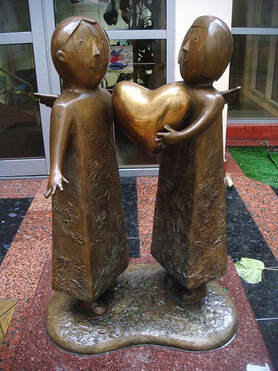|
Readings for Ash Wednesday Joel 2:1-2, 12-17/Isa 58:1-12; Ps 51:1-17; 2 Cor 5:20b-6:10; Matt 6:1-6,16-21  Reva, Mikhail. Heart of the World, from Art in the Christian Tradition, a project of the Vanderbilt Divinity Library, Nashville, TN. Reva, Mikhail. Heart of the World, from Art in the Christian Tradition, a project of the Vanderbilt Divinity Library, Nashville, TN. With the exception of the reading from 2 Corinthians, the lections for Ash Wednesday in 2021 draw on the world of religious practices from both ancient Israel and the Greco-Roman world. They refer to the rituals of fasting, sacrifice, praying, almsgiving, mourning (tearing one’s clothes, wearing sackcloth, and sitting on ashes), and purification. Though it is difficult to generalize about such a wide variety of rituals, they are practices that, for the most part, could stand apart from the calendar-based rituals such as the Sabbath or feasts such as Passover and Rosh Hashanah. (To be sure, both prayers and sacrifice were part of practices on the Sabbath and fasting took place on the Day of Atonement.) One lamented when suffering from an illness, the death of a family member, or a terrible life experience. One fasted at times of national distress or catastrophe. One sought purification at moments when an individual had become ritually unclean. One could give money at any time to someone who was in need. There is therefore, a certain flexibility in such practice (though not so much for rites of sacrifice and purification, for which there were written rules). The poems preserved in the books of Isaiah, Joel, and Psalms attest to striking creativity in thinking about these rituals. Isa 58:6-7, “Is not this the fast that I choose, to loose the bonds of injustice….to share your bread with the hungry…?” challenges those in the community to stop fasting while they are oppressing their fellow Israelites, (v. 3). When the Psalmist (51: 16-17) claims that God has no delight in sacrifice and affirms that “The sacrifice that is acceptable to God is a broken spirit//a broken and contrite heart…,” he is provoking deep reflection about the human heart and a plea for God to “create in me a clean heart.” When Joel (2:13) calls the people to return to God “with fasting, with weeping, and with mourning,” he also tells them to “tear your hearts and not your clothing.” These writers are encouraging others in the community to think expansively about these rituals. The gospel reading, written in prose, represents less of a rethinking about the rituals of almsgiving, prayer, and fasting than it does about a concern for the way they are practiced. In the Sermon on the Mount (Matt 6), the Matthean Jesus affirms the practices of almsgiving, prayer, and fasting, “whenever you…” (vv. 2, 5, 16). But he wants to make sure that those who enact them receive their “reward,” which comes from their Father, not from those in the community who might be watching them. These acts should be done quietly, without calling attention to the practitioner. God, who “sees in secret” (4, 6, 18) will then reward the worshiper, presumably in the form of “treasures in heaven” (v. 20).
2 Comments
Hal Chorpenning
2/16/2021 12:40:55 pm
Thanks for the insightful thoughts about "spiritual practices" in the ancient Near East!
Reply
Cheryl Wilkinson
2/18/2021 03:04:08 pm
The expansive view David talks about as it relates to Lent seems to be dual purposed: it refers to self-reflection but then asks us to turn outward towards our hurting world (fasting becomes providing meals for those in need and the tearing of clothing becomes donating clothing to local shelters etc.) Putting our faith and reflection into action. I like it!
Reply
Your comment will be posted after it is approved.
Leave a Reply. |
Details
AuthorDavid Petersen is Franklin N. Parker Professor Emeritus of Old Testament, Emory University. While at Emory, he was also Academic Dean at the Candler School of Theology, where he received the Emory Williams Distinguished Teaching Award. Archives
April 2021
Categories
All
|

 RSS Feed
RSS Feed